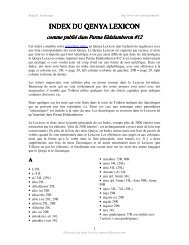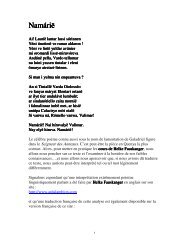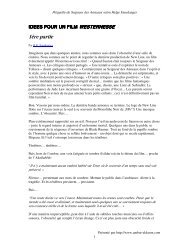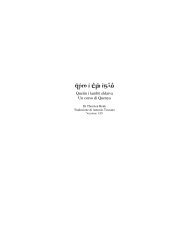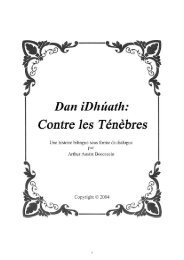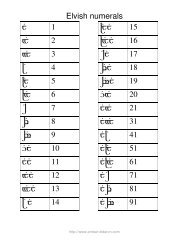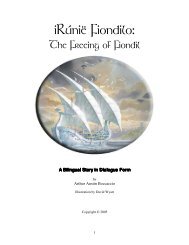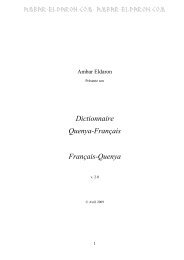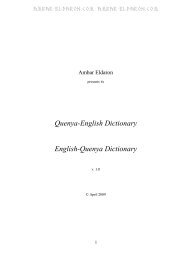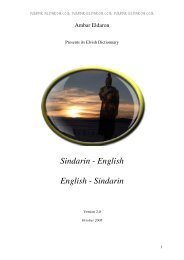Quenya Reverse Wordlist - Ambar Eldaron
Quenya Reverse Wordlist - Ambar Eldaron
Quenya Reverse Wordlist - Ambar Eldaron
You also want an ePaper? Increase the reach of your titles
YUMPU automatically turns print PDFs into web optimized ePapers that Google loves.
Helge K. Fauskanger http://www.uib.no/People/hnohf/<br />
enros sornë, sor "eagle" (LT1:266); rather<br />
sorno, soron in mature <strong>Quenya</strong><br />
enrut turnë pa.t. of tur- (TUR)<br />
enúc cúnë ("k") "crescent, bow" (LT1:271).<br />
Cf. cú.<br />
enúdna andúnë "sunset, west, evening"<br />
(NDÛ, Markirya, SA), also in Namárië: Andúnë<br />
"West" (but the standard <strong>Quenya</strong> translation of "west"<br />
is Númen) (Nam, RGEO:66) Cf. andu- in Andúnië,<br />
Andúril.<br />
enúl lúnë "blue" (LUG 2 , LT1:262; Namárië<br />
has #luin)<br />
enullat tallunë "sole of foot" (TALAM,<br />
RUN)<br />
enúlleiN Niellúnë "Sirius" (a star), also<br />
Nierninwa (LT1:262)<br />
ép pé "lip", dual peu "the two lips, the<br />
mouth-opening" (VT39:9). In an earlier source, the<br />
Etymologies, pé was glossed "mouth" (PEG)<br />
eplet telpë "silver", telep- in some<br />
compounds like Teleporno; assimilated telem- in<br />
Telemnar (KYELEP/TELEP, SA:celeb, LT1:255,<br />
268; also tyelpë, telep-, UT:266). The true <strong>Quenya</strong><br />
descendant of primitive *kyelepê is tyelpë, but the<br />
Telerin form telpë was more common, "for the Teleri<br />
prized silver above gold, and their skill as<br />
silversmiths was esteemed even by the Noldor"<br />
(UT:266). Telperion the White Tree of Valinor;<br />
Telperien ("Telperiën"), fem. name including telp-<br />
"silver" (Appendix A); Telperinquar "Silver-fist,<br />
Celebrimbor" (SA:celeb - also Tyelperinquar);<br />
Telporno, Teleporno "Silver-high" = Sindarin<br />
Celeborn (Letters:347, UT:266). It seems that<br />
Teleporno is properly Telerin, <strong>Quenya</strong>rized as<br />
Telporno.<br />
epleyt tyelpë "silver" (KYELEP/TELEP),<br />
etymology also in Letters:426 and UT:266. Tyelpë is<br />
the true <strong>Quenya</strong> descendant of primitive *kyelepê, but<br />
the Telerin form telpë was more common, "for the<br />
Teleri prized silver above gold, and their skill as<br />
silversmiths was esteemed even by the Noldor"<br />
(UT:266).<br />
epmat tampë "copper" (LT1:268; in mature<br />
<strong>Quenya</strong> tampë is [also?] the past tense of tap- "stop,<br />
block")<br />
epmat tampë pa.t. of tápë, see tap- (TAP)<br />
epmel lempë "five" (LEP/LEPEN/LEPEK,<br />
GL:53)<br />
epmil limpë "(wine), drink of the Valar"<br />
(LIP), cf. the early "Qenya" gloss "drink of the<br />
fairies" (LT1:258)<br />
epmit timpë "fine rain" (LT1:268,<br />
Narqelion)<br />
epmot tompë pa.t. of top- (topë) (TOP)<br />
ér ré "day" (of the sun) (Appendix D); short<br />
-rë in compounds like Ringarë<br />
31<br />
erá árë "day" (PM:127) or "sunlight"<br />
(SA:arien). Also name of tengwa 31; cf. also ar # 2.<br />
Originally pronounced ázë; when /z/ merged with /r/,<br />
the letter became superfluous and was given the new<br />
value ss, hence it was re-named essë (Appendix E).<br />
Also árë nuquerna *"árë reversed", name of tengwa<br />
32, similar to normal árë but turned upside down<br />
(Appendix E). –In the Etymologies, this word has a<br />
short vowel: arë pl. ari (AR 1 )<br />
eradlon noldarë "mole"; also nolpa (GL:30)<br />
eráf fárë "sufficiency, plenitude, all that is<br />
wanted" (PHAR)<br />
eragniR Ringarë the twelfth and last month<br />
of the year, "December" (Appendix D, SA:ring); the<br />
word seems to mean "Cold-day".<br />
erah harë, har "near" (LT1:253)<br />
eramla almarë "blessedness, 'blessings',<br />
good fortune, bliss" (GALA)<br />
eramlI Ilmarë "starlight", also name of a<br />
Maia (GIL, SA:ilm-)<br />
erán nárë, also short nár, "flame" (NAR 1 ,<br />
Narqelion). Translated "fire" in some names, see<br />
Aicanáro, Fëanáro (where nár apparently has the<br />
masculine ending -o)<br />
erasat tasarë, tasar "willow-tree"<br />
(TATHAR). In Tasarinan *"Willow-valley", Nantasarion<br />
*"Valley of willows" (SA:tathar)<br />
erát tárë "in that day", not translated in its<br />
first occurrence in Fíriel's Song<br />
eratno ontarë "begetter, parent" (fem); pl.<br />
ontari (see ontani) covers both sexes. (ONO)<br />
eratsey yestarë *"first-day", the first day of<br />
the year (loa), immediately before tuilë (Appendix<br />
D)<br />
eráuq quárë (also quár) "fist" (SA:celeb,<br />
KWAR; in the Etymologies, Tolkien first wrote quár<br />
pl. quari, and quár is also found in PM:318. As<br />
usual, the Etym forms have q instead of qu.)<br />
According to PM:318, the "chief use [of this word]<br />
was in reference to the tightly closed hand as in using<br />
an implement or a craft-tool rather than to the 'fist' as<br />
used in punching".<br />
eráy yárë "former days" (YA)<br />
eraynaf fanyarë "the skies" (not heaven or<br />
firmament - the upper airs and clouds). Note that<br />
despite its English gloss, fanyarë is a singular word<br />
and therefore takes a singular adjective/participle, as<br />
in fanyarë rúcina "ruined skies" in Markirya (see<br />
MC:220, note 8 for this translation)<br />
eráyne enyárë "in that day" (pointing to the<br />
future) (FS)<br />
eráynemul lumenyárë "history,<br />
chronological account" (NAR 2 - read *lúmenyárë?)<br />
ere erë, eren "iron" or "steel"; Eremandu<br />
variant of Angamandu (Angband) (LT1:252; "iron"<br />
Presented by http://www.ambar-eldaron.com



